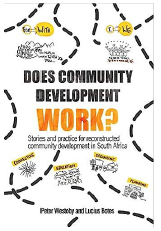Servicios Personalizados
Articulo
Indicadores
Links relacionados
-
 Citado por Google
Citado por Google -
 Similares en Google
Similares en Google
Compartir
Town and Regional Planning
versión On-line ISSN 2415-0495
versión impresa ISSN 1012-280X
Town reg. plan. (Online) vol.82 Bloemfontein 2023
http://dx.doi.org/10.18820/trp.v82i.7399
BOOK REVIEWS
Does community development work? Stories and practice for reconstructed community development in South Africa
Thomas Stewart
Senior Lecturer, Department of Urban and Regional Planning, P.O. Box 339, University of the Free State, Bloemfontein, South Africa. Email: StewartT@ufs.ac.za
Authors: Peter Westoby and Lucius Botes
Publisher: Practical Action Publishing Ltd
ISBN:9781788531290
Date: 2020

To depart from a structured, colonial approach in community development to a creative imaginary vision, subjected to processes, procedures, and technologies, requires both an epistemological and practical change in praxis. The authors acknowledge that there is no pre-determined single framework or modus to promote as the perfect trajectory towards a renewed vision. Cues are rather taken from civil society, community projects and initiatives in understanding community development in a decolonised context, "they worked with people from 'inside out', based on the particularity of place and context".
The book comprises three parts. Part I sets the scene and gives the context in terms of concepts, assumptions, and the evaluation of community development. Part II examines means of assessing the effectiveness of the diversity of community development activities in South Africa and "reaches towards a social reconstruction tradition of community development underpinned by a decolonizing perspective". The authors criticise the ease of reverting to predetermined frameworks rather than developing new ones.
Benchmarked against the visions of distinguished people such as Mahatma Gandhi, Steve Biko, Es'kia Mphahlele, and Neville Alexander, this book provides readers with insight into the challenges of social transformation guided by the decolonised framework of Fanon. Part III consists of the sharing of stories, each unique and a chapter on its own. The case studies reveal an awareness of the diversity of community development initiatives in rural, urban, traditional, remote, regional, local, poverty, anger, institutional, and political contexts. Practices dealing with education, land reform, housing, protests, cooperatives, urban agriculture, and real-life experiences combine in an easy read captivating style, partially due to the personal action-oriented involvement of the authors in researching the content of the case studies.
There is no doubt that urban and regional planners and human settlement practitioners alike will benefit from the powerful and rich content of this book. Urban planning and land use in the developing world, make a significant contribution to community development. Practitioners in these disciplines cannot afford to continue practicing in an outdated paradigm, paying lip service to community participation and by implication being oblivious to the major community development role planning, human settlements and our physical environment must play. As illustrated in this book, decolonisation goes a long way in sensitising urban planning and human settlement practitioners to transform their approaches and align their practices to action associated with community initiatives and projects rather than product solutions imposed on people. As a scholarly, practice and professional read, this book is recommended to all those who operate in this space.














